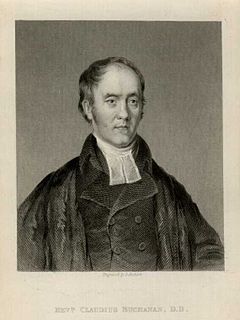A Quote by Claudius Buchanan
Every branch of knowledge which a good man possesses, he may apply to some good purpose.
Related Quotes
There are some terrific resources on how to find individual purpose but relative resources on how to discover purpose and apply to an organization. My challenge was to show organizations how they could unlock the purpose of their organizations and put it to good use for employees to apply to their own jobs. The net effect is to help individuals, teams and organizations to optimize performance by understanding how to use purpose for good intention.
The good, say the mystics of spirit, is God, a being whose only definition is that he is beyond man's power to conceive — a definition that invalidates man's consciousness and nullifies his concepts of existence. The good, say the mystics of muscle, is Society — a thing which they define as an organism that possesses no physical form, a super-being embodied in no one in particular and everyone in general except yourself.... The purpose of man's life, say both, is to become an abject zombie who serves a purpose he does not know, for reasons he is not to question.
History is valuable, to begin with, because it is true; and this, though not the whole of its value, is the foundation and condition of all the rest. That all knowledge, as such, is in some degree good, would appear to be at least probable; and the knowledge of every historical fact possesses this element of goodness, even if it posses no other.
Every man, however hopeless his pretensions may appear, has some project by which he hopes to rise to reputation; some art by which he imagines that the attention of the world will be attracted; some quality, good or bad, which discriminates him from the common herd of mortals, and by which others may be persuaded to love, or compelled to fear him.
Every community is an association of some kind and every community is established with a view to some good; for everyone always acts in order to obtain that which they think good. But, if all communities aim at some good, the state or political community, which is the highest of all, and which embraces all the rest, aims at good in a greater degree than any other, and at the highest good.
Every man is prompted by the love of himself to imagine that he possesses some qualities, superior, either in kind or degree, to those which he sees allotted to the rest of the world; and, whatever apparent disadvantages he may suffer in the comparison with others, he has some invisible distinctions, some latent reserve of excellence, which he throws into the balance, and by which he generally fancies that it is turned in his favour.
There is not any present moment that is unconnected with some future one. The life of every man is a continued chain of incidents, each link of which hangs upon the former. The transition from cause to effect, from event to event, is often carried on by secret steps, which our foresight cannot divine, and our sagacity is unable to trace. Evil may at some future period bring forth good; and good may bring forth evil, both equally unexpected.
It indicates a person who has not only good manners but who possesses a sense of balance, a sure mastery of himself, a moral discipline that permits him to subordinate voluntarily his own selfish interest to the wider interests of the society in which he lives. The gentleman, therefore is a cultural person in the noblest sense of the word, if by culture we mean not simply wealth of intellectual knowledge but also the ability to fulfil one's duty and understand one's fellow man by respecting / every principle, every opinion, every faith that is sincerely professed.
We do not merely give a religious education because that would seem to imply the possibility of some other education, a secular education, for example. But we hold that all education is divine, that every good gift of knowledge and insight comes from above, that the Lord the Holy Spirit is the supreme educator of mankind, and that the culmination of all education (which may at the same time be reached by a little child) is that personal knowledge of and intimacy with God in which our being finds its fullest perfection.
There is (gentle reader) nothing (the works of God only set apart) which so much beautifies and adorns the soul and mind of man as does knowledge of the good arts and sciences . Many arts there are which beautify the mind of man; but of all none do more garnish and beautify it than those arts which are called mathematical , unto the knowledge of which no man can attain, without perfect knowledge and instruction of the principles, grounds, and Elements of Geometry.
It's where we're nearest to our humanness. Useless knowledge for its own sake. Useful knowledge is good, too, but it's for the faint-hearted, an elaboration of the real thing, which is only to shine some light, it doesn't matter where on what, it's the light itself, against the darkness, it's what's left of God's purpose when you take away God.
French wines may be said but to pickle meat in the stomach, but this is the wine that digests, and doth not only breed good blood, but it nutrifieth also, being a glutinous substantial liquor; of this wine, if of any other, may be verified that merry induction: That good wine makes good blood, good blood causeth good humors, good humors cause good thoughts, good thoughts bring forth good works, good works carry a man to heaven, ergo, good wine carrieth a man to heaven.
































